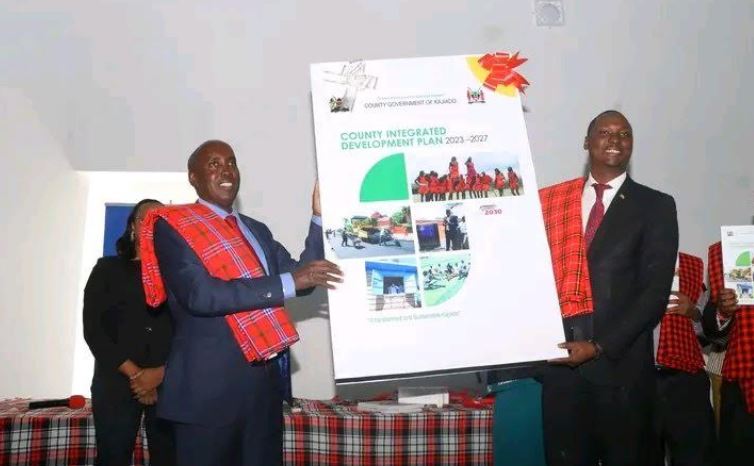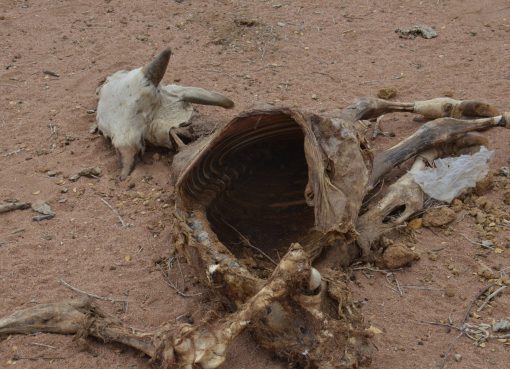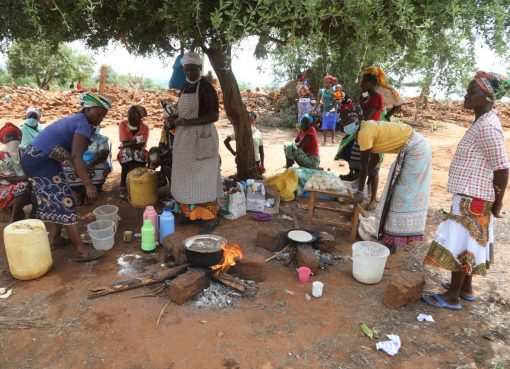Kajiado County Government has launched the Third County Integrated Development Plan (CIDP III) for 2023–2027 at Umma University.
The 5-year development plan is aimed at steering the county’s development towards quality education, climate resilience, modulated pastoralism, and livable towns.
In his speech during the launch on Thursday, Governor Joseph Ole Lenku said the 2023–2027 CIDP implementation process started in July 2023 and is a roadmap for development for the next five years.
The plan is in line with the vision of the country, the Bottom-Up Economic Agenda, and was crafted from the manifestos they used during their second term campaign for governance.
“The 2023–2027 CIDP is aligned to the national development framework, the Kenya Vision 2030, and its fourth medium-term plan, the Bottom-Up Economic Agenda (BETA), together with international commitments and obligations such as the Sustainable Development Goals (SDGs), the Paris Agreement on Climate Change, and the Sendai Framework,” said Governor Lenku.
The 2023–2027 CIDP unveiled outlines of programmes and projects with clear output, targets, indications, and expected outcomes that will try to help achieve a transformed and sustainable Kajiado.
In the plan, the county has highlighted how it will improve the education sector, commercialise pastoralism, advance technology in the health and education sectors, achieve livable towns, and furthermore handle matters on climate change and mitigation.
“We are working towards a modulated pastoralism which will focus on animal feed production, livestock management, livestock market development, livelihood diversification, county aggregation, and industrial parks. We are working towards moving our pastoralism in a commercial direction so that communities depending on pastoralism do not suffer severe damages from weather as witnessed in the last years,” revealed Governor Lenku.
“On matters of education, we are working with global partners to explore the possibilities of global scholarships and bursaries. We are targeting e-learning so that we can embrace technology so that our children get the best possible education. In health, we wish to purposely ensure health financing, social insurance, health commodities security, an integrated data management information system, and primary health care interventions, in line with our national agenda”, added Governor Lenku.
The governor appealed to all county residents to commit themselves and play part in the implementation of the plan, as well as the county government officials to coordinate all the county stakeholders in the implementation of the plan.
The governor mentioned that their 2018–2022 CIDP faced various challenges that resulted from the COVID-19 pandemic, where they failed to reach their revenue target, experienced prolonged droughts that ran from 2019 to 2022, and greatly affected the county’s ability to achieve agricultural milestones and livestock production.
“We faced the challenge of not achieving our revenue target, resulting in our inability to fully implement our programmes. It has significantly contributed to the current situation we have faced in regards to pending bills across all sectors of our economy. Termination of a number of grants that were able to come our way,” pointed Governor Lenku.
Despite the challenges experienced during the last CIDP, the county has made some positive strides in various sectors like health and education. It has enhanced access to health care across the county through the recruitment of health personnel, the improvement of infrastructure, increased specialised services such as eye and dental services, oncology, ICU, MRI Citi scan services, blood transfusion, and the Mbuzi moja afya bora campaign, which sensitised the community to get the National Health Insurance Fund.
The county has worked towards ensuring the needy and vulnerable have access to education, where the county government invested in scholarships and bursary programmes amounting from Sh 30 million to Sh 150 million.
By Seline Nyangere





